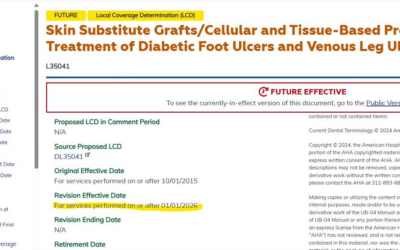Most patients with chronic non-healing wounds have multiple medical conditions, and the physicians who care for them may be considering using the G2211 code. The 2024 Medicare Physician Fee Schedule allows physicians to list G2211 to indicate additional work they undertake, to provide comprehensive and continuous care to patients with complex conditions or one serious condition. However, the rules for using this code are complex and the care provided in wound management may not qualify. Of additional concern is the way that the G2211 code may or may not be actually paid. The 2024 Medicare allowable amount for G2211 varies geographically, but is usually around $16.00. However, two major payers have either reduced payment for G2211 claims or announced plans to stop paying certain claims associated with the code altogether in some plans.
For example, UnitedHealthcare (UHC) will no longer pay claims with G2211 for services rendered to commercial plan members beginning Sept. 1. Per UHC’s June 2024 policy update, the payer will still pay for services associated with G2211 if they are related to outpatient evaluation and management (E/M) services provided to Medicare Advantage plan members. However, it appears that claims for commercial plan holders will be denied, likely being bundled into the primary E/M services. This move appears to align with guidelines from the Centers for Medicare & Medicaid Services (CMS) on the code but will likely cause payment frustration for physicians who provide comprehensive care to patients with complex conditions. The Texas Medical Association (TMA) has learned that Aetna is erroneously paying only one cent to physicians for G2211 claims. Aetna representatives have told TMA they will rework claims with G2211 to ensure the full allowable amount is paid.
TMA experts recommend physicians use G2211 when:
- They have assumed or intend to assume responsibility for the patient’s ongoing medical care; AND
- Their visits with the patient are routine or time-limited.
A physician who sees a patient for an acute concern should not report G2211 if they have not also assumed responsibility for the patient’s ongoing medical care or do not plan to take responsibility for subsequent medical care. The rules are complex, and a billing and coding expert may need to provide guidance to wound care practitioners who wish to bill for the additional work required in complex patients.





